Organisational Behaviour Report: Analysis of John Lewis Partnership
VerifiedAdded on 2023/01/11
|17
|5232
|51
Report
AI Summary
This report provides an in-depth analysis of organizational behaviour, specifically within the context of the John Lewis Partnership. It begins by exploring the impact of organizational aspects such as culture, politics, and power on team conduct and individual performance, highlighting the importance of a positive work environment. The report then delves into different motivation theories, including content theories like Maslow's Hierarchy of Needs and process theories like Vroom's Expectancy Theory, evaluating how these theories can be applied to enhance employee motivation and achieve organizational goals. Furthermore, the report examines the impact of culture, power, and politics on team behaviour and organizational effectiveness. The report concludes with a comprehensive overview of the concepts and philosophies of organizational behaviour, providing valuable insights into fostering a productive and motivated workforce.
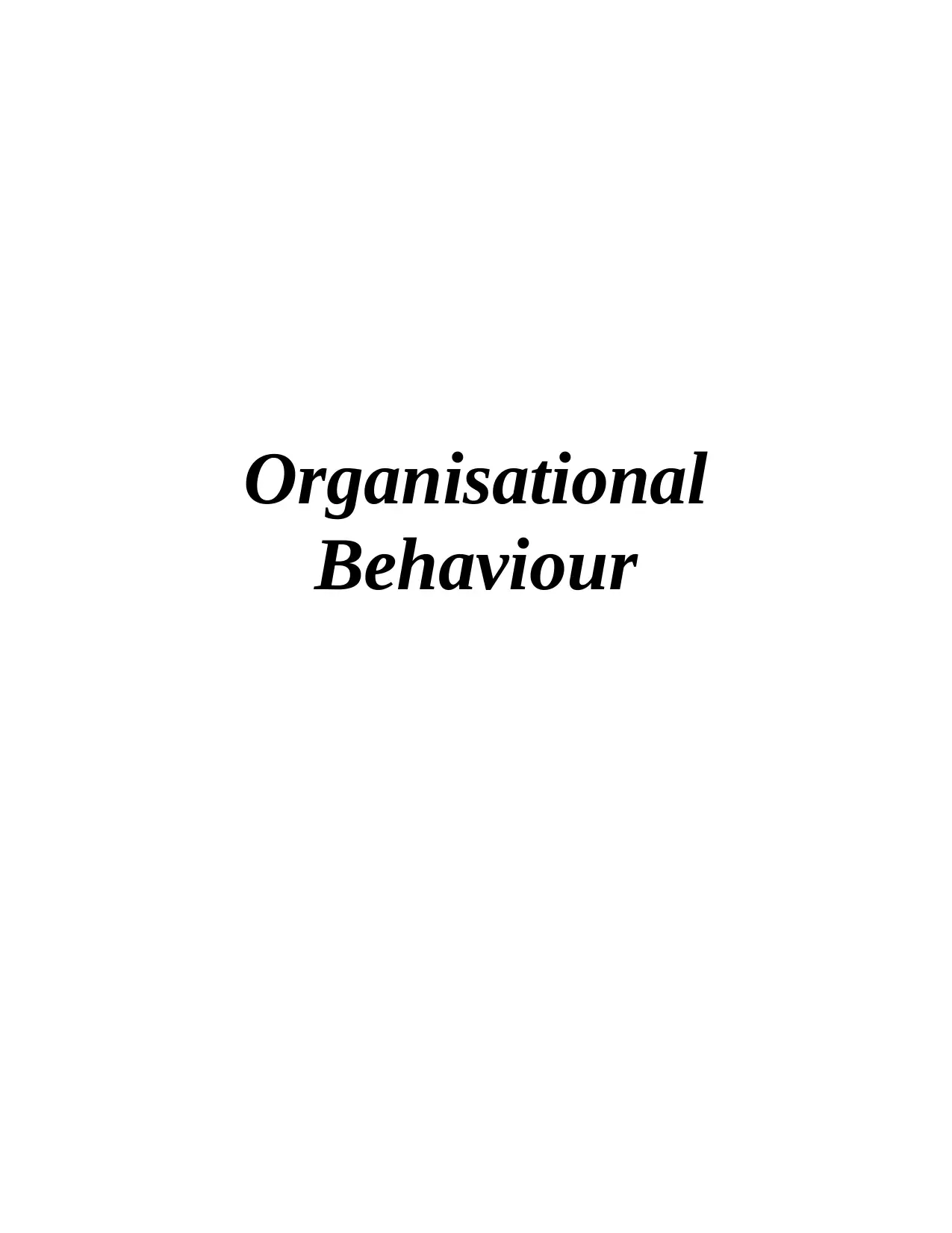
Organisational
Behaviour
Behaviour
Paraphrase This Document
Need a fresh take? Get an instant paraphrase of this document with our AI Paraphraser
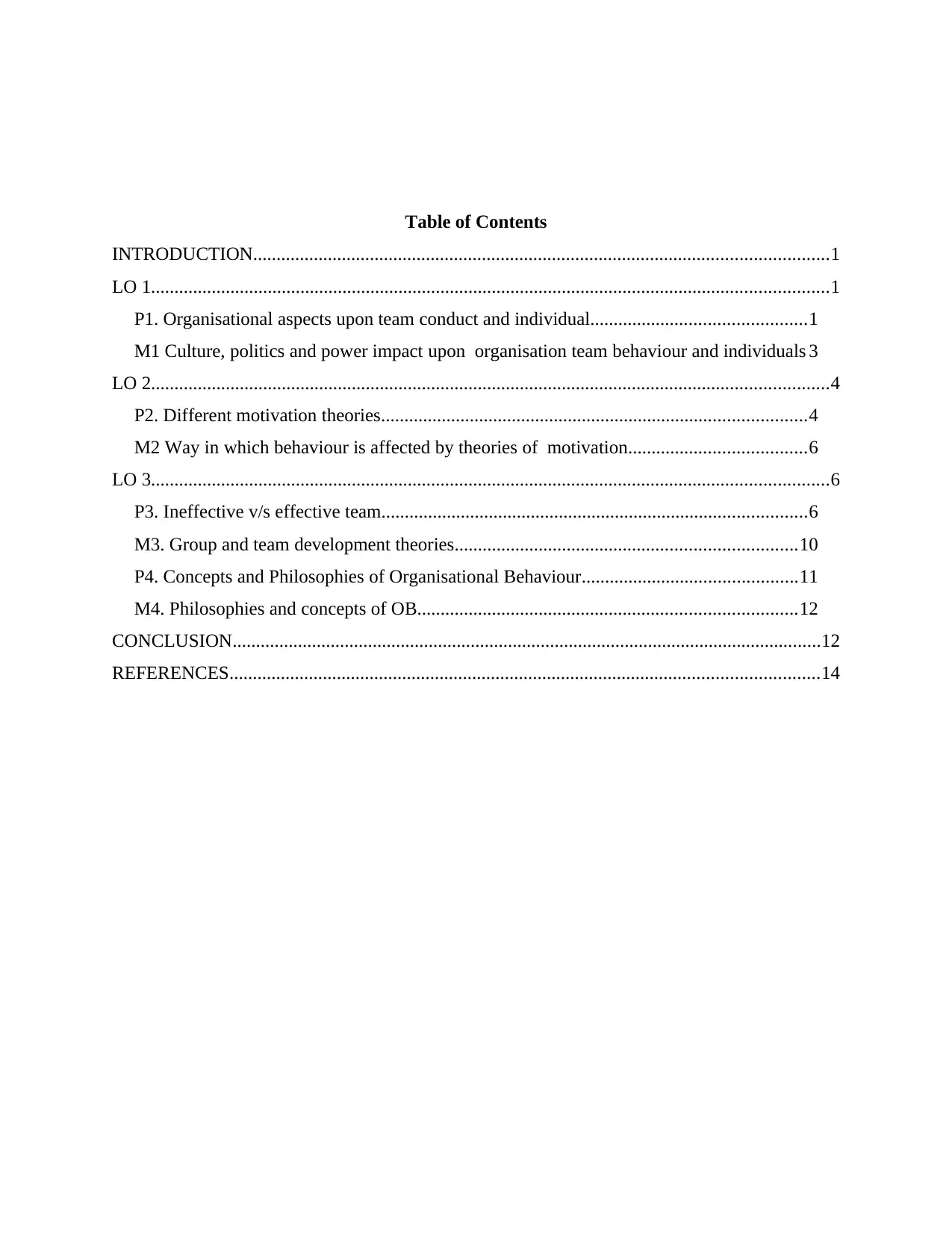
Table of Contents
INTRODUCTION...........................................................................................................................1
LO 1.................................................................................................................................................1
P1. Organisational aspects upon team conduct and individual..............................................1
M1 Culture, politics and power impact upon organisation team behaviour and individuals 3
LO 2.................................................................................................................................................4
P2. Different motivation theories...........................................................................................4
M2 Way in which behaviour is affected by theories of motivation......................................6
LO 3.................................................................................................................................................6
P3. Ineffective v/s effective team...........................................................................................6
M3. Group and team development theories.........................................................................10
P4. Concepts and Philosophies of Organisational Behaviour..............................................11
M4. Philosophies and concepts of OB.................................................................................12
CONCLUSION..............................................................................................................................12
REFERENCES..............................................................................................................................14
INTRODUCTION...........................................................................................................................1
LO 1.................................................................................................................................................1
P1. Organisational aspects upon team conduct and individual..............................................1
M1 Culture, politics and power impact upon organisation team behaviour and individuals 3
LO 2.................................................................................................................................................4
P2. Different motivation theories...........................................................................................4
M2 Way in which behaviour is affected by theories of motivation......................................6
LO 3.................................................................................................................................................6
P3. Ineffective v/s effective team...........................................................................................6
M3. Group and team development theories.........................................................................10
P4. Concepts and Philosophies of Organisational Behaviour..............................................11
M4. Philosophies and concepts of OB.................................................................................12
CONCLUSION..............................................................................................................................12
REFERENCES..............................................................................................................................14
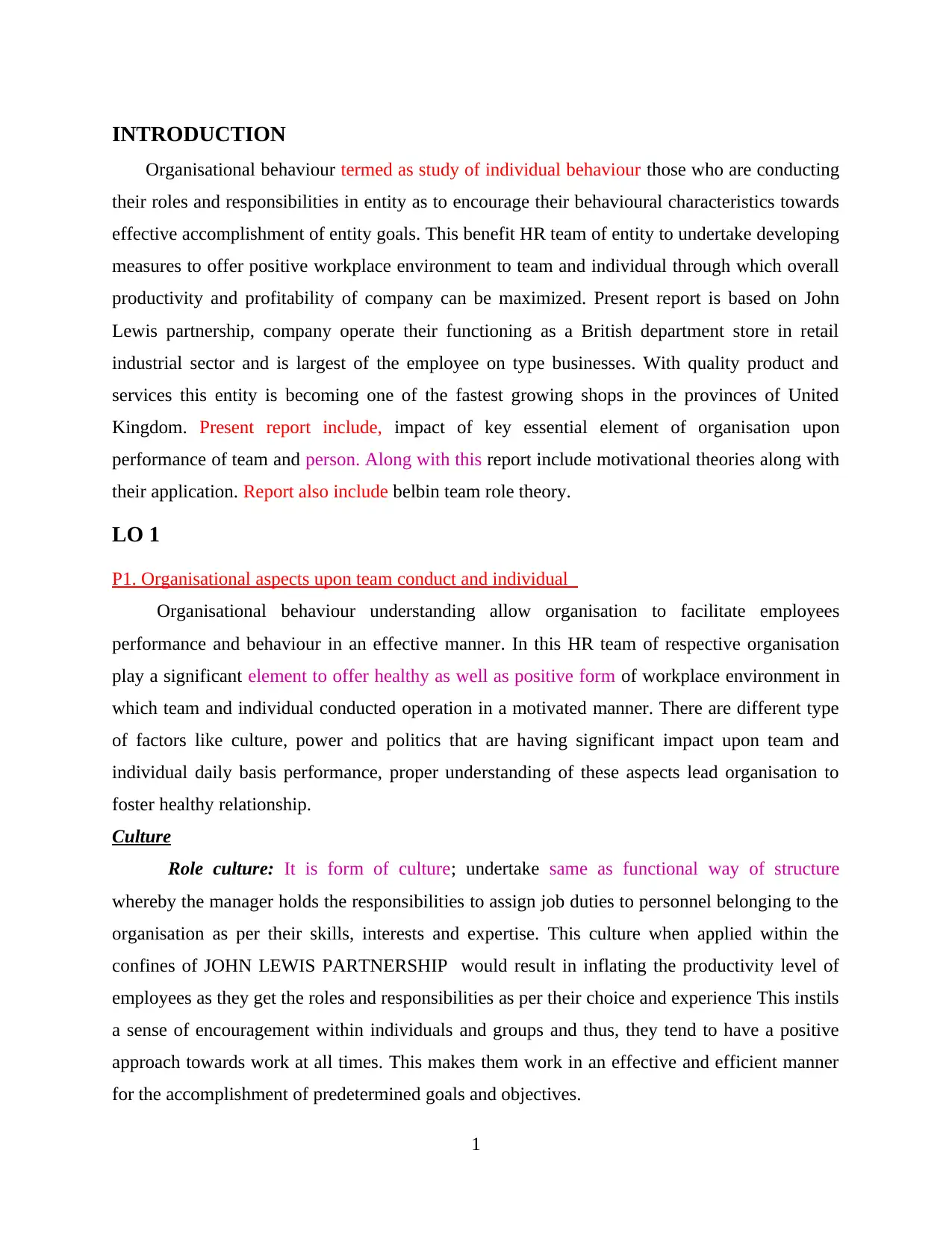
INTRODUCTION
Organisational behaviour termed as study of individual behaviour those who are conducting
their roles and responsibilities in entity as to encourage their behavioural characteristics towards
effective accomplishment of entity goals. This benefit HR team of entity to undertake developing
measures to offer positive workplace environment to team and individual through which overall
productivity and profitability of company can be maximized. Present report is based on John
Lewis partnership, company operate their functioning as a British department store in retail
industrial sector and is largest of the employee on type businesses. With quality product and
services this entity is becoming one of the fastest growing shops in the provinces of United
Kingdom. Present report include, impact of key essential element of organisation upon
performance of team and person. Along with this report include motivational theories along with
their application. Report also include belbin team role theory.
LO 1
P1. Organisational aspects upon team conduct and individual
Organisational behaviour understanding allow organisation to facilitate employees
performance and behaviour in an effective manner. In this HR team of respective organisation
play a significant element to offer healthy as well as positive form of workplace environment in
which team and individual conducted operation in a motivated manner. There are different type
of factors like culture, power and politics that are having significant impact upon team and
individual daily basis performance, proper understanding of these aspects lead organisation to
foster healthy relationship.
Culture
Role culture: It is form of culture; undertake same as functional way of structure
whereby the manager holds the responsibilities to assign job duties to personnel belonging to the
organisation as per their skills, interests and expertise. This culture when applied within the
confines of JOHN LEWIS PARTNERSHIP would result in inflating the productivity level of
employees as they get the roles and responsibilities as per their choice and experience This instils
a sense of encouragement within individuals and groups and thus, they tend to have a positive
approach towards work at all times. This makes them work in an effective and efficient manner
for the accomplishment of predetermined goals and objectives.
1
Organisational behaviour termed as study of individual behaviour those who are conducting
their roles and responsibilities in entity as to encourage their behavioural characteristics towards
effective accomplishment of entity goals. This benefit HR team of entity to undertake developing
measures to offer positive workplace environment to team and individual through which overall
productivity and profitability of company can be maximized. Present report is based on John
Lewis partnership, company operate their functioning as a British department store in retail
industrial sector and is largest of the employee on type businesses. With quality product and
services this entity is becoming one of the fastest growing shops in the provinces of United
Kingdom. Present report include, impact of key essential element of organisation upon
performance of team and person. Along with this report include motivational theories along with
their application. Report also include belbin team role theory.
LO 1
P1. Organisational aspects upon team conduct and individual
Organisational behaviour understanding allow organisation to facilitate employees
performance and behaviour in an effective manner. In this HR team of respective organisation
play a significant element to offer healthy as well as positive form of workplace environment in
which team and individual conducted operation in a motivated manner. There are different type
of factors like culture, power and politics that are having significant impact upon team and
individual daily basis performance, proper understanding of these aspects lead organisation to
foster healthy relationship.
Culture
Role culture: It is form of culture; undertake same as functional way of structure
whereby the manager holds the responsibilities to assign job duties to personnel belonging to the
organisation as per their skills, interests and expertise. This culture when applied within the
confines of JOHN LEWIS PARTNERSHIP would result in inflating the productivity level of
employees as they get the roles and responsibilities as per their choice and experience This instils
a sense of encouragement within individuals and groups and thus, they tend to have a positive
approach towards work at all times. This makes them work in an effective and efficient manner
for the accomplishment of predetermined goals and objectives.
1
⊘ This is a preview!⊘
Do you want full access?
Subscribe today to unlock all pages.

Trusted by 1+ million students worldwide
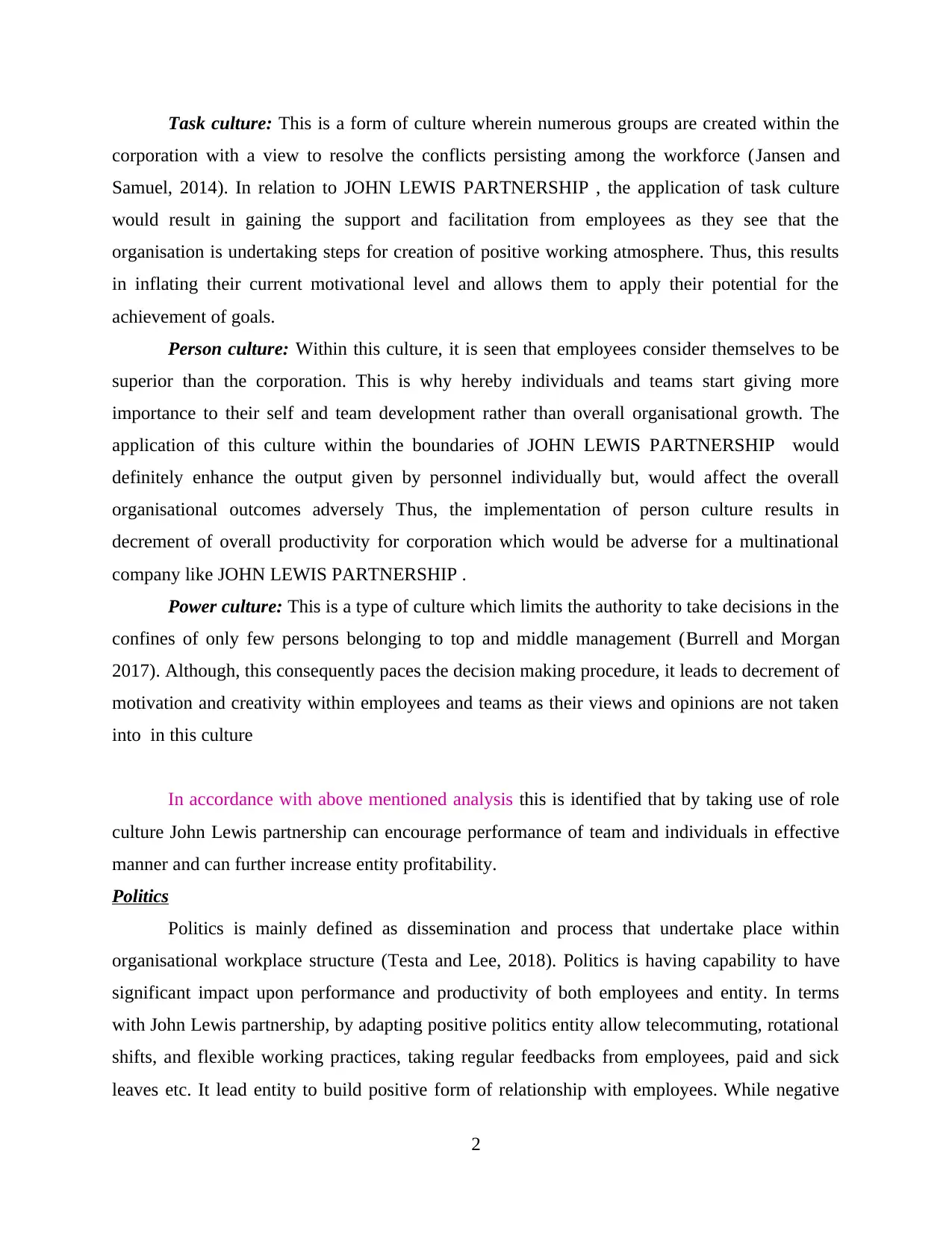
Task culture: This is a form of culture wherein numerous groups are created within the
corporation with a view to resolve the conflicts persisting among the workforce (Jansen and
Samuel, 2014). In relation to JOHN LEWIS PARTNERSHIP , the application of task culture
would result in gaining the support and facilitation from employees as they see that the
organisation is undertaking steps for creation of positive working atmosphere. Thus, this results
in inflating their current motivational level and allows them to apply their potential for the
achievement of goals.
Person culture: Within this culture, it is seen that employees consider themselves to be
superior than the corporation. This is why hereby individuals and teams start giving more
importance to their self and team development rather than overall organisational growth. The
application of this culture within the boundaries of JOHN LEWIS PARTNERSHIP would
definitely enhance the output given by personnel individually but, would affect the overall
organisational outcomes adversely Thus, the implementation of person culture results in
decrement of overall productivity for corporation which would be adverse for a multinational
company like JOHN LEWIS PARTNERSHIP .
Power culture: This is a type of culture which limits the authority to take decisions in the
confines of only few persons belonging to top and middle management (Burrell and Morgan
2017). Although, this consequently paces the decision making procedure, it leads to decrement of
motivation and creativity within employees and teams as their views and opinions are not taken
into in this culture
In accordance with above mentioned analysis this is identified that by taking use of role
culture John Lewis partnership can encourage performance of team and individuals in effective
manner and can further increase entity profitability.
Politics
Politics is mainly defined as dissemination and process that undertake place within
organisational workplace structure (Testa and Lee, 2018). Politics is having capability to have
significant impact upon performance and productivity of both employees and entity. In terms
with John Lewis partnership, by adapting positive politics entity allow telecommuting, rotational
shifts, and flexible working practices, taking regular feedbacks from employees, paid and sick
leaves etc. It lead entity to build positive form of relationship with employees. While negative
2
corporation with a view to resolve the conflicts persisting among the workforce (Jansen and
Samuel, 2014). In relation to JOHN LEWIS PARTNERSHIP , the application of task culture
would result in gaining the support and facilitation from employees as they see that the
organisation is undertaking steps for creation of positive working atmosphere. Thus, this results
in inflating their current motivational level and allows them to apply their potential for the
achievement of goals.
Person culture: Within this culture, it is seen that employees consider themselves to be
superior than the corporation. This is why hereby individuals and teams start giving more
importance to their self and team development rather than overall organisational growth. The
application of this culture within the boundaries of JOHN LEWIS PARTNERSHIP would
definitely enhance the output given by personnel individually but, would affect the overall
organisational outcomes adversely Thus, the implementation of person culture results in
decrement of overall productivity for corporation which would be adverse for a multinational
company like JOHN LEWIS PARTNERSHIP .
Power culture: This is a type of culture which limits the authority to take decisions in the
confines of only few persons belonging to top and middle management (Burrell and Morgan
2017). Although, this consequently paces the decision making procedure, it leads to decrement of
motivation and creativity within employees and teams as their views and opinions are not taken
into in this culture
In accordance with above mentioned analysis this is identified that by taking use of role
culture John Lewis partnership can encourage performance of team and individuals in effective
manner and can further increase entity profitability.
Politics
Politics is mainly defined as dissemination and process that undertake place within
organisational workplace structure (Testa and Lee, 2018). Politics is having capability to have
significant impact upon performance and productivity of both employees and entity. In terms
with John Lewis partnership, by adapting positive politics entity allow telecommuting, rotational
shifts, and flexible working practices, taking regular feedbacks from employees, paid and sick
leaves etc. It lead entity to build positive form of relationship with employees. While negative
2
Paraphrase This Document
Need a fresh take? Get an instant paraphrase of this document with our AI Paraphraser
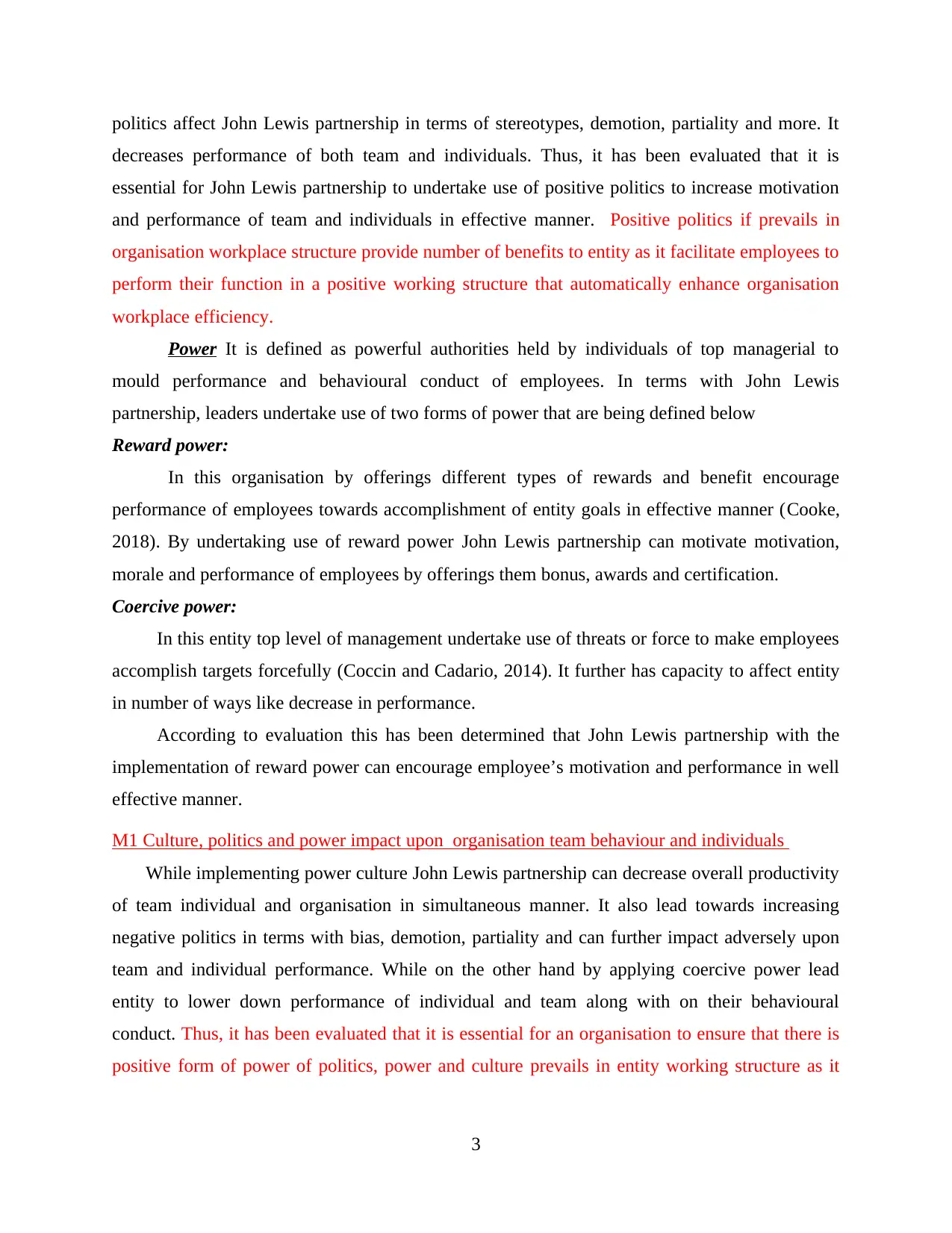
politics affect John Lewis partnership in terms of stereotypes, demotion, partiality and more. It
decreases performance of both team and individuals. Thus, it has been evaluated that it is
essential for John Lewis partnership to undertake use of positive politics to increase motivation
and performance of team and individuals in effective manner. Positive politics if prevails in
organisation workplace structure provide number of benefits to entity as it facilitate employees to
perform their function in a positive working structure that automatically enhance organisation
workplace efficiency.
Power It is defined as powerful authorities held by individuals of top managerial to
mould performance and behavioural conduct of employees. In terms with John Lewis
partnership, leaders undertake use of two forms of power that are being defined below
Reward power:
In this organisation by offerings different types of rewards and benefit encourage
performance of employees towards accomplishment of entity goals in effective manner (Cooke,
2018). By undertaking use of reward power John Lewis partnership can motivate motivation,
morale and performance of employees by offerings them bonus, awards and certification.
Coercive power:
In this entity top level of management undertake use of threats or force to make employees
accomplish targets forcefully (Coccin and Cadario, 2014). It further has capacity to affect entity
in number of ways like decrease in performance.
According to evaluation this has been determined that John Lewis partnership with the
implementation of reward power can encourage employee’s motivation and performance in well
effective manner.
M1 Culture, politics and power impact upon organisation team behaviour and individuals
While implementing power culture John Lewis partnership can decrease overall productivity
of team individual and organisation in simultaneous manner. It also lead towards increasing
negative politics in terms with bias, demotion, partiality and can further impact adversely upon
team and individual performance. While on the other hand by applying coercive power lead
entity to lower down performance of individual and team along with on their behavioural
conduct. Thus, it has been evaluated that it is essential for an organisation to ensure that there is
positive form of power of politics, power and culture prevails in entity working structure as it
3
decreases performance of both team and individuals. Thus, it has been evaluated that it is
essential for John Lewis partnership to undertake use of positive politics to increase motivation
and performance of team and individuals in effective manner. Positive politics if prevails in
organisation workplace structure provide number of benefits to entity as it facilitate employees to
perform their function in a positive working structure that automatically enhance organisation
workplace efficiency.
Power It is defined as powerful authorities held by individuals of top managerial to
mould performance and behavioural conduct of employees. In terms with John Lewis
partnership, leaders undertake use of two forms of power that are being defined below
Reward power:
In this organisation by offerings different types of rewards and benefit encourage
performance of employees towards accomplishment of entity goals in effective manner (Cooke,
2018). By undertaking use of reward power John Lewis partnership can motivate motivation,
morale and performance of employees by offerings them bonus, awards and certification.
Coercive power:
In this entity top level of management undertake use of threats or force to make employees
accomplish targets forcefully (Coccin and Cadario, 2014). It further has capacity to affect entity
in number of ways like decrease in performance.
According to evaluation this has been determined that John Lewis partnership with the
implementation of reward power can encourage employee’s motivation and performance in well
effective manner.
M1 Culture, politics and power impact upon organisation team behaviour and individuals
While implementing power culture John Lewis partnership can decrease overall productivity
of team individual and organisation in simultaneous manner. It also lead towards increasing
negative politics in terms with bias, demotion, partiality and can further impact adversely upon
team and individual performance. While on the other hand by applying coercive power lead
entity to lower down performance of individual and team along with on their behavioural
conduct. Thus, it has been evaluated that it is essential for an organisation to ensure that there is
positive form of power of politics, power and culture prevails in entity working structure as it
3
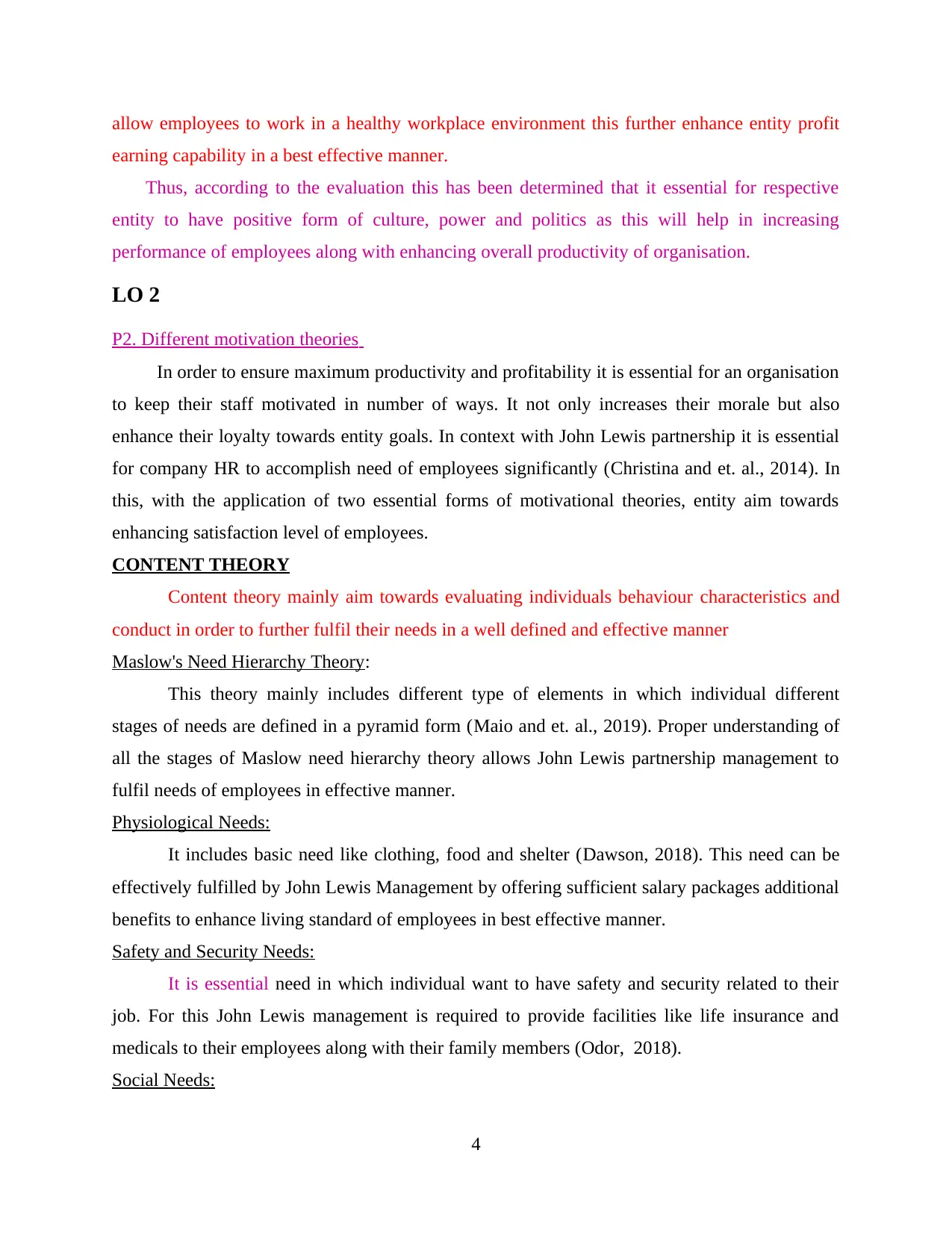
allow employees to work in a healthy workplace environment this further enhance entity profit
earning capability in a best effective manner.
Thus, according to the evaluation this has been determined that it essential for respective
entity to have positive form of culture, power and politics as this will help in increasing
performance of employees along with enhancing overall productivity of organisation.
LO 2
P2. Different motivation theories
In order to ensure maximum productivity and profitability it is essential for an organisation
to keep their staff motivated in number of ways. It not only increases their morale but also
enhance their loyalty towards entity goals. In context with John Lewis partnership it is essential
for company HR to accomplish need of employees significantly (Christina and et. al., 2014). In
this, with the application of two essential forms of motivational theories, entity aim towards
enhancing satisfaction level of employees.
CONTENT THEORY
Content theory mainly aim towards evaluating individuals behaviour characteristics and
conduct in order to further fulfil their needs in a well defined and effective manner
Maslow's Need Hierarchy Theory:
This theory mainly includes different type of elements in which individual different
stages of needs are defined in a pyramid form (Maio and et. al., 2019). Proper understanding of
all the stages of Maslow need hierarchy theory allows John Lewis partnership management to
fulfil needs of employees in effective manner.
Physiological Needs:
It includes basic need like clothing, food and shelter (Dawson, 2018). This need can be
effectively fulfilled by John Lewis Management by offering sufficient salary packages additional
benefits to enhance living standard of employees in best effective manner.
Safety and Security Needs:
It is essential need in which individual want to have safety and security related to their
job. For this John Lewis management is required to provide facilities like life insurance and
medicals to their employees along with their family members (Odor, 2018).
Social Needs:
4
earning capability in a best effective manner.
Thus, according to the evaluation this has been determined that it essential for respective
entity to have positive form of culture, power and politics as this will help in increasing
performance of employees along with enhancing overall productivity of organisation.
LO 2
P2. Different motivation theories
In order to ensure maximum productivity and profitability it is essential for an organisation
to keep their staff motivated in number of ways. It not only increases their morale but also
enhance their loyalty towards entity goals. In context with John Lewis partnership it is essential
for company HR to accomplish need of employees significantly (Christina and et. al., 2014). In
this, with the application of two essential forms of motivational theories, entity aim towards
enhancing satisfaction level of employees.
CONTENT THEORY
Content theory mainly aim towards evaluating individuals behaviour characteristics and
conduct in order to further fulfil their needs in a well defined and effective manner
Maslow's Need Hierarchy Theory:
This theory mainly includes different type of elements in which individual different
stages of needs are defined in a pyramid form (Maio and et. al., 2019). Proper understanding of
all the stages of Maslow need hierarchy theory allows John Lewis partnership management to
fulfil needs of employees in effective manner.
Physiological Needs:
It includes basic need like clothing, food and shelter (Dawson, 2018). This need can be
effectively fulfilled by John Lewis Management by offering sufficient salary packages additional
benefits to enhance living standard of employees in best effective manner.
Safety and Security Needs:
It is essential need in which individual want to have safety and security related to their
job. For this John Lewis management is required to provide facilities like life insurance and
medicals to their employees along with their family members (Odor, 2018).
Social Needs:
4
⊘ This is a preview!⊘
Do you want full access?
Subscribe today to unlock all pages.

Trusted by 1+ million students worldwide
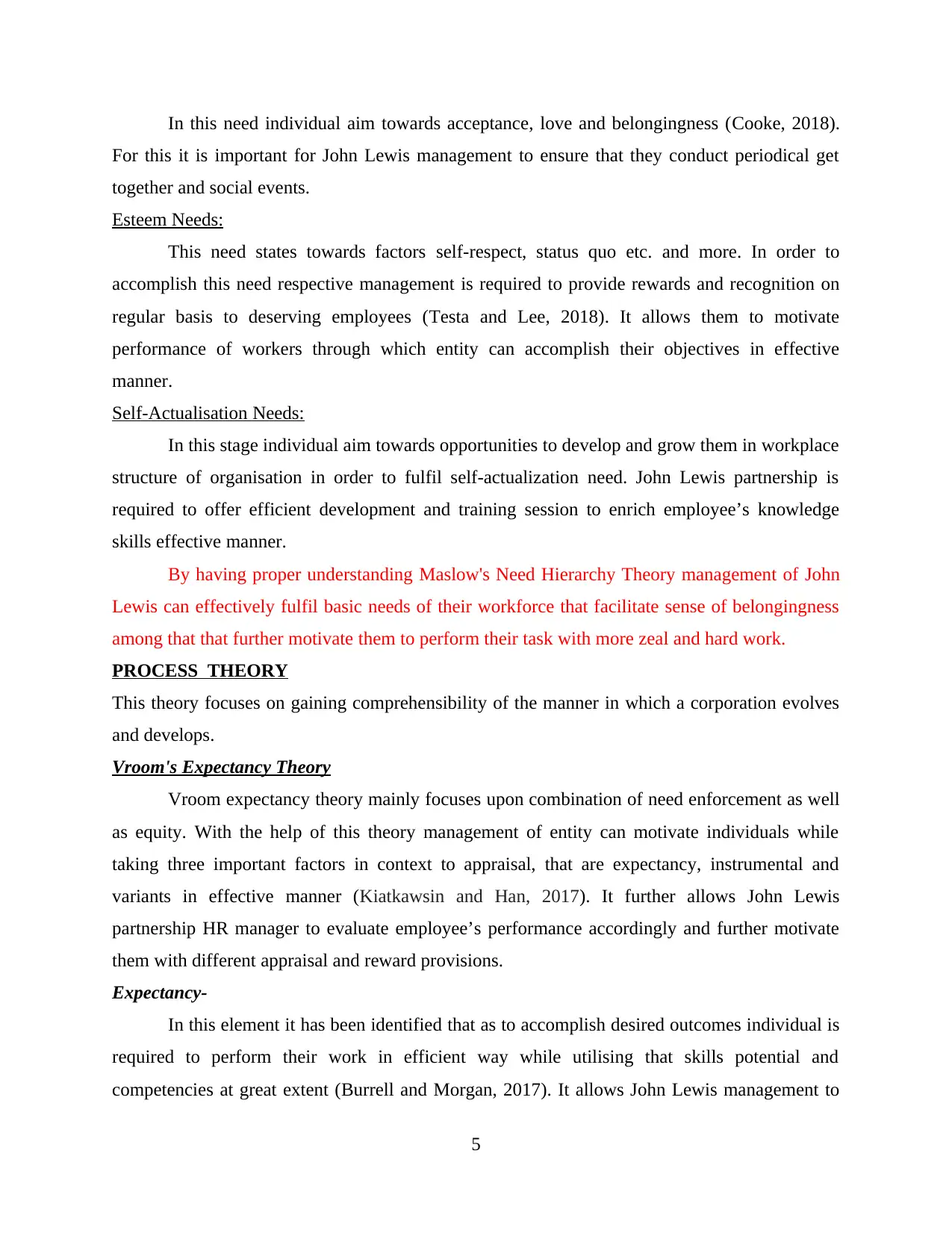
In this need individual aim towards acceptance, love and belongingness (Cooke, 2018).
For this it is important for John Lewis management to ensure that they conduct periodical get
together and social events.
Esteem Needs:
This need states towards factors self-respect, status quo etc. and more. In order to
accomplish this need respective management is required to provide rewards and recognition on
regular basis to deserving employees (Testa and Lee, 2018). It allows them to motivate
performance of workers through which entity can accomplish their objectives in effective
manner.
Self-Actualisation Needs:
In this stage individual aim towards opportunities to develop and grow them in workplace
structure of organisation in order to fulfil self-actualization need. John Lewis partnership is
required to offer efficient development and training session to enrich employee’s knowledge
skills effective manner.
By having proper understanding Maslow's Need Hierarchy Theory management of John
Lewis can effectively fulfil basic needs of their workforce that facilitate sense of belongingness
among that that further motivate them to perform their task with more zeal and hard work.
PROCESS THEORY
This theory focuses on gaining comprehensibility of the manner in which a corporation evolves
and develops.
Vroom's Expectancy Theory
Vroom expectancy theory mainly focuses upon combination of need enforcement as well
as equity. With the help of this theory management of entity can motivate individuals while
taking three important factors in context to appraisal, that are expectancy, instrumental and
variants in effective manner (Kiatkawsin and Han, 2017). It further allows John Lewis
partnership HR manager to evaluate employee’s performance accordingly and further motivate
them with different appraisal and reward provisions.
Expectancy-
In this element it has been identified that as to accomplish desired outcomes individual is
required to perform their work in efficient way while utilising that skills potential and
competencies at great extent (Burrell and Morgan, 2017). It allows John Lewis management to
5
For this it is important for John Lewis management to ensure that they conduct periodical get
together and social events.
Esteem Needs:
This need states towards factors self-respect, status quo etc. and more. In order to
accomplish this need respective management is required to provide rewards and recognition on
regular basis to deserving employees (Testa and Lee, 2018). It allows them to motivate
performance of workers through which entity can accomplish their objectives in effective
manner.
Self-Actualisation Needs:
In this stage individual aim towards opportunities to develop and grow them in workplace
structure of organisation in order to fulfil self-actualization need. John Lewis partnership is
required to offer efficient development and training session to enrich employee’s knowledge
skills effective manner.
By having proper understanding Maslow's Need Hierarchy Theory management of John
Lewis can effectively fulfil basic needs of their workforce that facilitate sense of belongingness
among that that further motivate them to perform their task with more zeal and hard work.
PROCESS THEORY
This theory focuses on gaining comprehensibility of the manner in which a corporation evolves
and develops.
Vroom's Expectancy Theory
Vroom expectancy theory mainly focuses upon combination of need enforcement as well
as equity. With the help of this theory management of entity can motivate individuals while
taking three important factors in context to appraisal, that are expectancy, instrumental and
variants in effective manner (Kiatkawsin and Han, 2017). It further allows John Lewis
partnership HR manager to evaluate employee’s performance accordingly and further motivate
them with different appraisal and reward provisions.
Expectancy-
In this element it has been identified that as to accomplish desired outcomes individual is
required to perform their work in efficient way while utilising that skills potential and
competencies at great extent (Burrell and Morgan, 2017). It allows John Lewis management to
5
Paraphrase This Document
Need a fresh take? Get an instant paraphrase of this document with our AI Paraphraser
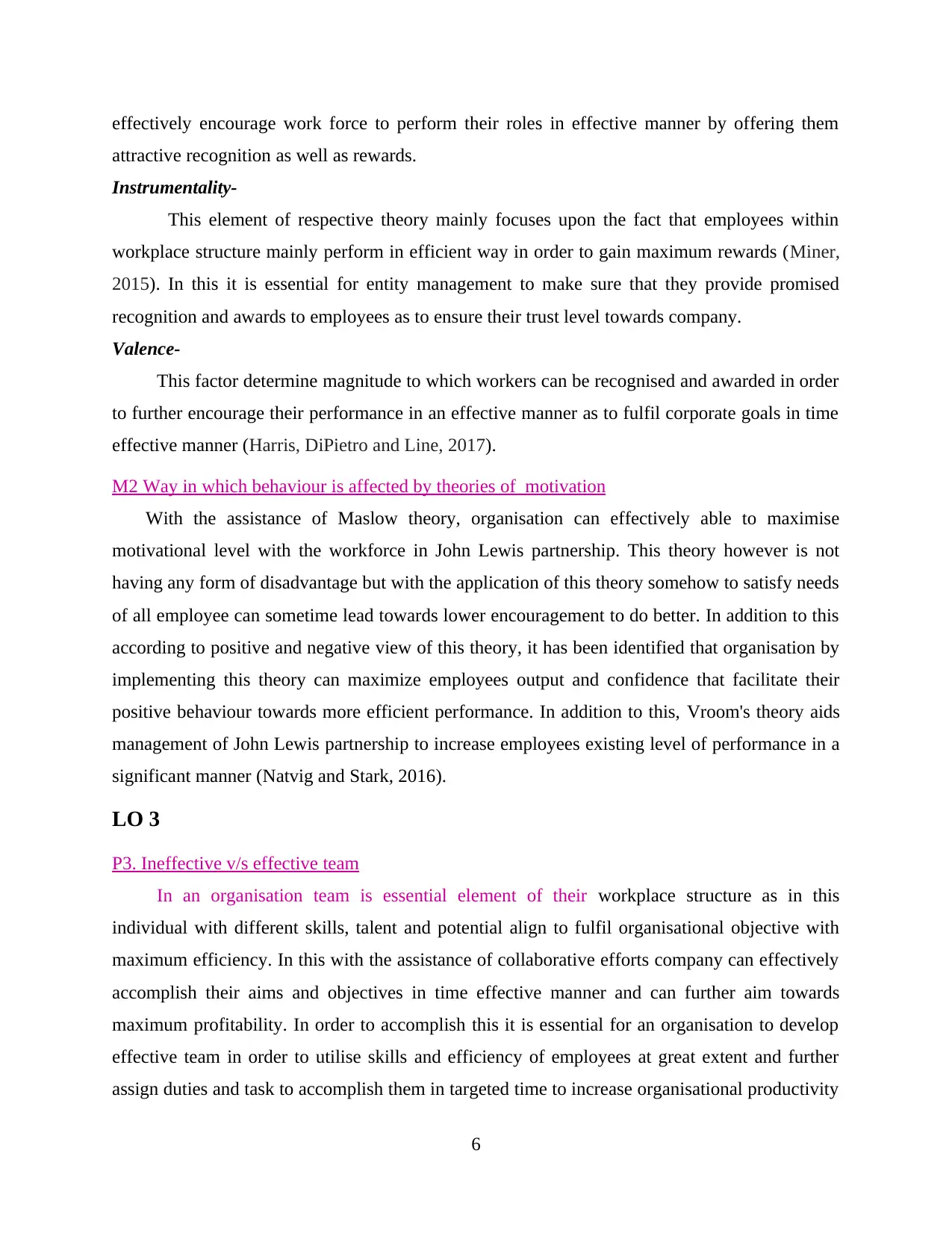
effectively encourage work force to perform their roles in effective manner by offering them
attractive recognition as well as rewards.
Instrumentality-
This element of respective theory mainly focuses upon the fact that employees within
workplace structure mainly perform in efficient way in order to gain maximum rewards (Miner,
2015). In this it is essential for entity management to make sure that they provide promised
recognition and awards to employees as to ensure their trust level towards company.
Valence-
This factor determine magnitude to which workers can be recognised and awarded in order
to further encourage their performance in an effective manner as to fulfil corporate goals in time
effective manner (Harris, DiPietro and Line, 2017).
M2 Way in which behaviour is affected by theories of motivation
With the assistance of Maslow theory, organisation can effectively able to maximise
motivational level with the workforce in John Lewis partnership. This theory however is not
having any form of disadvantage but with the application of this theory somehow to satisfy needs
of all employee can sometime lead towards lower encouragement to do better. In addition to this
according to positive and negative view of this theory, it has been identified that organisation by
implementing this theory can maximize employees output and confidence that facilitate their
positive behaviour towards more efficient performance. In addition to this, Vroom's theory aids
management of John Lewis partnership to increase employees existing level of performance in a
significant manner (Natvig and Stark, 2016).
LO 3
P3. Ineffective v/s effective team
In an organisation team is essential element of their workplace structure as in this
individual with different skills, talent and potential align to fulfil organisational objective with
maximum efficiency. In this with the assistance of collaborative efforts company can effectively
accomplish their aims and objectives in time effective manner and can further aim towards
maximum profitability. In order to accomplish this it is essential for an organisation to develop
effective team in order to utilise skills and efficiency of employees at great extent and further
assign duties and task to accomplish them in targeted time to increase organisational productivity
6
attractive recognition as well as rewards.
Instrumentality-
This element of respective theory mainly focuses upon the fact that employees within
workplace structure mainly perform in efficient way in order to gain maximum rewards (Miner,
2015). In this it is essential for entity management to make sure that they provide promised
recognition and awards to employees as to ensure their trust level towards company.
Valence-
This factor determine magnitude to which workers can be recognised and awarded in order
to further encourage their performance in an effective manner as to fulfil corporate goals in time
effective manner (Harris, DiPietro and Line, 2017).
M2 Way in which behaviour is affected by theories of motivation
With the assistance of Maslow theory, organisation can effectively able to maximise
motivational level with the workforce in John Lewis partnership. This theory however is not
having any form of disadvantage but with the application of this theory somehow to satisfy needs
of all employee can sometime lead towards lower encouragement to do better. In addition to this
according to positive and negative view of this theory, it has been identified that organisation by
implementing this theory can maximize employees output and confidence that facilitate their
positive behaviour towards more efficient performance. In addition to this, Vroom's theory aids
management of John Lewis partnership to increase employees existing level of performance in a
significant manner (Natvig and Stark, 2016).
LO 3
P3. Ineffective v/s effective team
In an organisation team is essential element of their workplace structure as in this
individual with different skills, talent and potential align to fulfil organisational objective with
maximum efficiency. In this with the assistance of collaborative efforts company can effectively
accomplish their aims and objectives in time effective manner and can further aim towards
maximum profitability. In order to accomplish this it is essential for an organisation to develop
effective team in order to utilise skills and efficiency of employees at great extent and further
assign duties and task to accomplish them in targeted time to increase organisational productivity
6
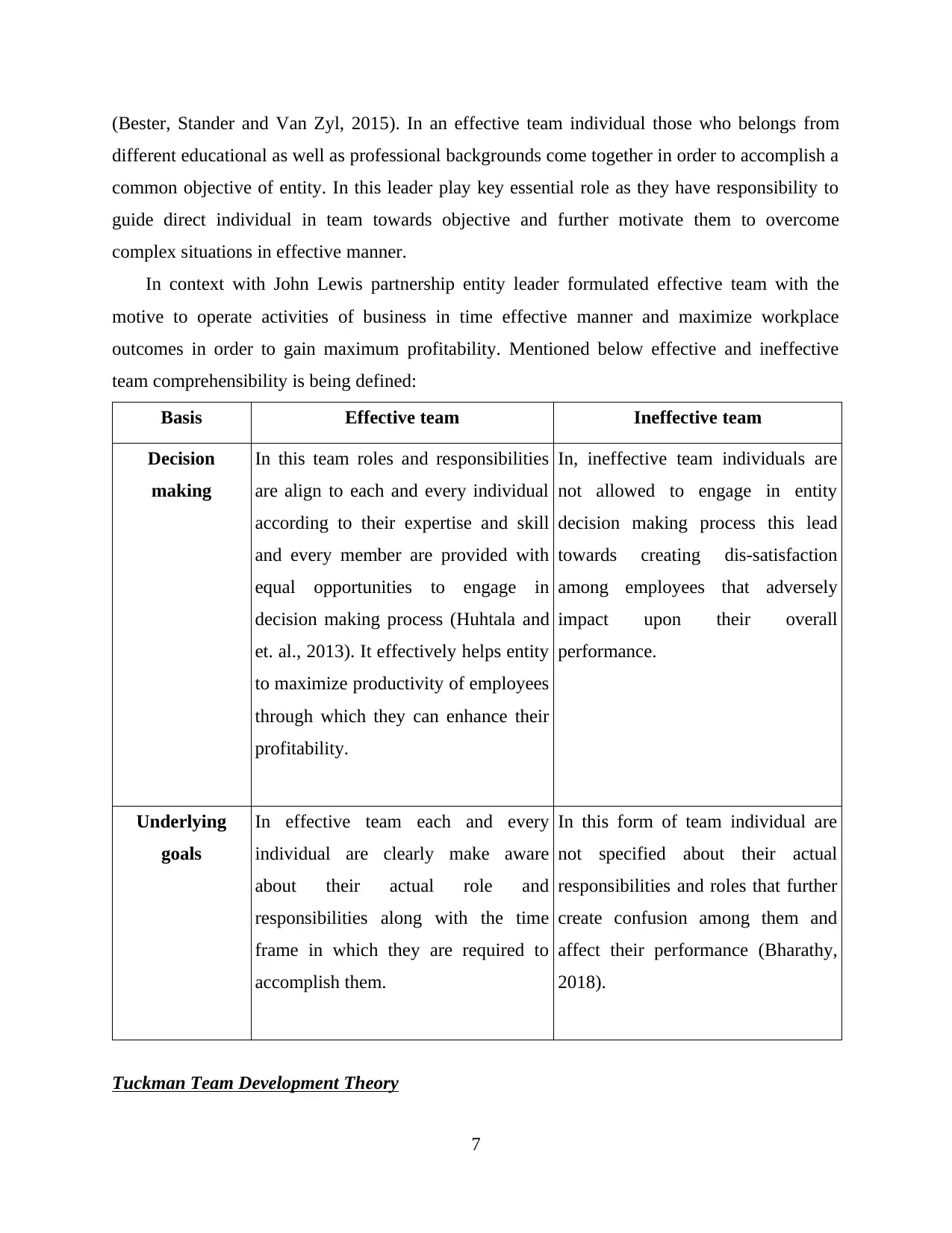
(Bester, Stander and Van Zyl, 2015). In an effective team individual those who belongs from
different educational as well as professional backgrounds come together in order to accomplish a
common objective of entity. In this leader play key essential role as they have responsibility to
guide direct individual in team towards objective and further motivate them to overcome
complex situations in effective manner.
In context with John Lewis partnership entity leader formulated effective team with the
motive to operate activities of business in time effective manner and maximize workplace
outcomes in order to gain maximum profitability. Mentioned below effective and ineffective
team comprehensibility is being defined:
Basis Effective team Ineffective team
Decision
making
In this team roles and responsibilities
are align to each and every individual
according to their expertise and skill
and every member are provided with
equal opportunities to engage in
decision making process (Huhtala and
et. al., 2013). It effectively helps entity
to maximize productivity of employees
through which they can enhance their
profitability.
In, ineffective team individuals are
not allowed to engage in entity
decision making process this lead
towards creating dis-satisfaction
among employees that adversely
impact upon their overall
performance.
Underlying
goals
In effective team each and every
individual are clearly make aware
about their actual role and
responsibilities along with the time
frame in which they are required to
accomplish them.
In this form of team individual are
not specified about their actual
responsibilities and roles that further
create confusion among them and
affect their performance (Bharathy,
2018).
Tuckman Team Development Theory
7
different educational as well as professional backgrounds come together in order to accomplish a
common objective of entity. In this leader play key essential role as they have responsibility to
guide direct individual in team towards objective and further motivate them to overcome
complex situations in effective manner.
In context with John Lewis partnership entity leader formulated effective team with the
motive to operate activities of business in time effective manner and maximize workplace
outcomes in order to gain maximum profitability. Mentioned below effective and ineffective
team comprehensibility is being defined:
Basis Effective team Ineffective team
Decision
making
In this team roles and responsibilities
are align to each and every individual
according to their expertise and skill
and every member are provided with
equal opportunities to engage in
decision making process (Huhtala and
et. al., 2013). It effectively helps entity
to maximize productivity of employees
through which they can enhance their
profitability.
In, ineffective team individuals are
not allowed to engage in entity
decision making process this lead
towards creating dis-satisfaction
among employees that adversely
impact upon their overall
performance.
Underlying
goals
In effective team each and every
individual are clearly make aware
about their actual role and
responsibilities along with the time
frame in which they are required to
accomplish them.
In this form of team individual are
not specified about their actual
responsibilities and roles that further
create confusion among them and
affect their performance (Bharathy,
2018).
Tuckman Team Development Theory
7
⊘ This is a preview!⊘
Do you want full access?
Subscribe today to unlock all pages.

Trusted by 1+ million students worldwide
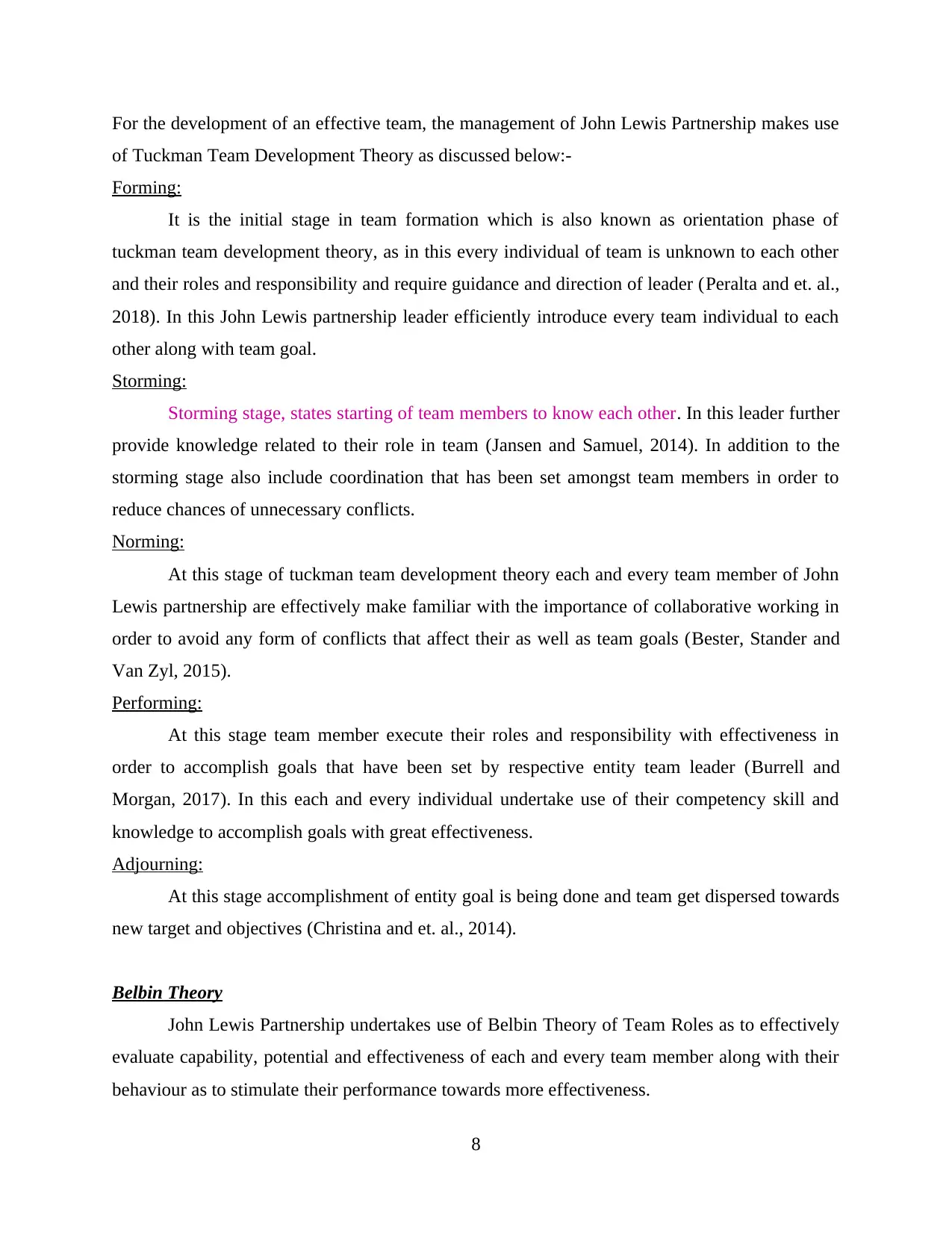
For the development of an effective team, the management of John Lewis Partnership makes use
of Tuckman Team Development Theory as discussed below:-
Forming:
It is the initial stage in team formation which is also known as orientation phase of
tuckman team development theory, as in this every individual of team is unknown to each other
and their roles and responsibility and require guidance and direction of leader (Peralta and et. al.,
2018). In this John Lewis partnership leader efficiently introduce every team individual to each
other along with team goal.
Storming:
Storming stage, states starting of team members to know each other. In this leader further
provide knowledge related to their role in team (Jansen and Samuel, 2014). In addition to the
storming stage also include coordination that has been set amongst team members in order to
reduce chances of unnecessary conflicts.
Norming:
At this stage of tuckman team development theory each and every team member of John
Lewis partnership are effectively make familiar with the importance of collaborative working in
order to avoid any form of conflicts that affect their as well as team goals (Bester, Stander and
Van Zyl, 2015).
Performing:
At this stage team member execute their roles and responsibility with effectiveness in
order to accomplish goals that have been set by respective entity team leader (Burrell and
Morgan, 2017). In this each and every individual undertake use of their competency skill and
knowledge to accomplish goals with great effectiveness.
Adjourning:
At this stage accomplishment of entity goal is being done and team get dispersed towards
new target and objectives (Christina and et. al., 2014).
Belbin Theory
John Lewis Partnership undertakes use of Belbin Theory of Team Roles as to effectively
evaluate capability, potential and effectiveness of each and every team member along with their
behaviour as to stimulate their performance towards more effectiveness.
8
of Tuckman Team Development Theory as discussed below:-
Forming:
It is the initial stage in team formation which is also known as orientation phase of
tuckman team development theory, as in this every individual of team is unknown to each other
and their roles and responsibility and require guidance and direction of leader (Peralta and et. al.,
2018). In this John Lewis partnership leader efficiently introduce every team individual to each
other along with team goal.
Storming:
Storming stage, states starting of team members to know each other. In this leader further
provide knowledge related to their role in team (Jansen and Samuel, 2014). In addition to the
storming stage also include coordination that has been set amongst team members in order to
reduce chances of unnecessary conflicts.
Norming:
At this stage of tuckman team development theory each and every team member of John
Lewis partnership are effectively make familiar with the importance of collaborative working in
order to avoid any form of conflicts that affect their as well as team goals (Bester, Stander and
Van Zyl, 2015).
Performing:
At this stage team member execute their roles and responsibility with effectiveness in
order to accomplish goals that have been set by respective entity team leader (Burrell and
Morgan, 2017). In this each and every individual undertake use of their competency skill and
knowledge to accomplish goals with great effectiveness.
Adjourning:
At this stage accomplishment of entity goal is being done and team get dispersed towards
new target and objectives (Christina and et. al., 2014).
Belbin Theory
John Lewis Partnership undertakes use of Belbin Theory of Team Roles as to effectively
evaluate capability, potential and effectiveness of each and every team member along with their
behaviour as to stimulate their performance towards more effectiveness.
8
Paraphrase This Document
Need a fresh take? Get an instant paraphrase of this document with our AI Paraphraser
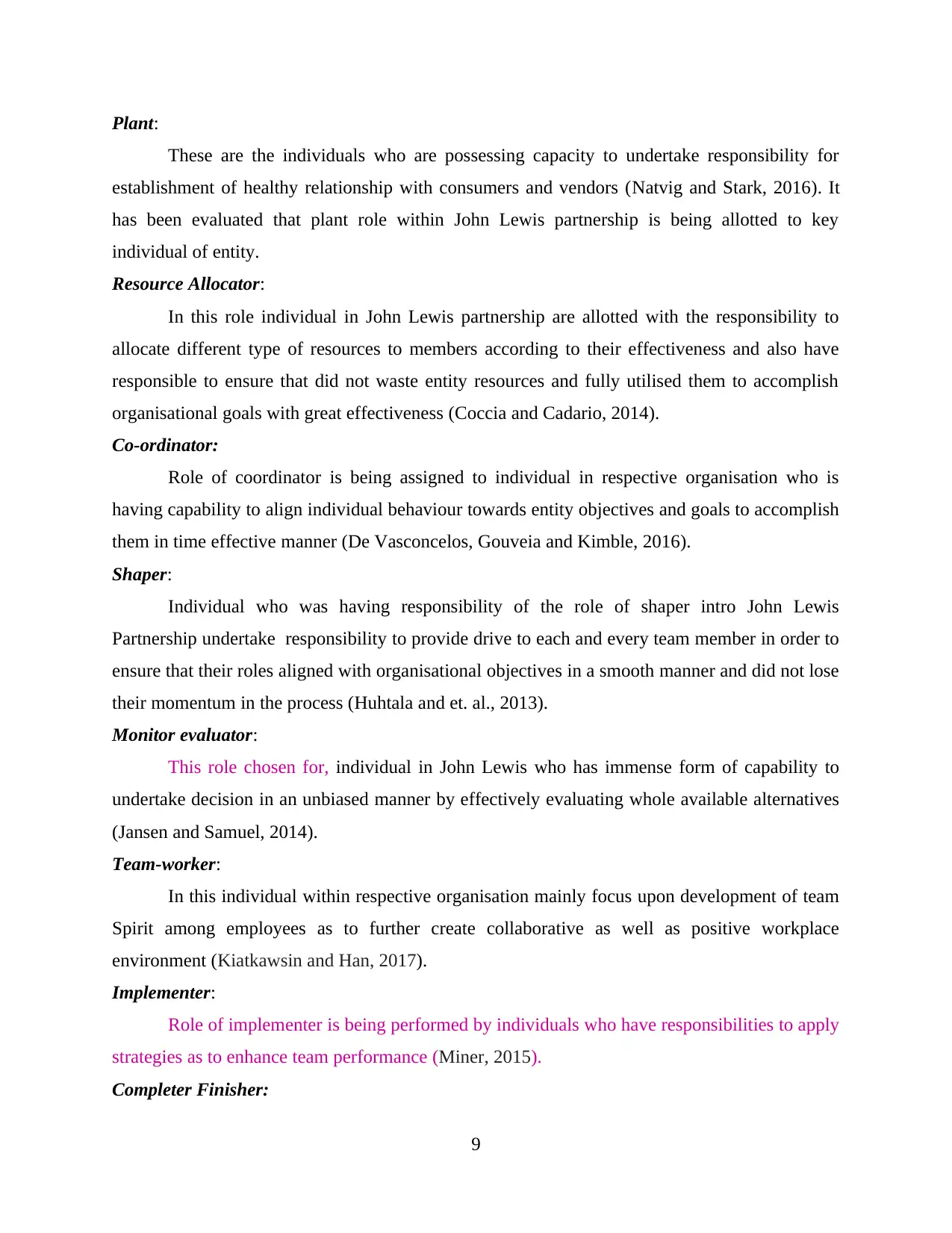
Plant:
These are the individuals who are possessing capacity to undertake responsibility for
establishment of healthy relationship with consumers and vendors (Natvig and Stark, 2016). It
has been evaluated that plant role within John Lewis partnership is being allotted to key
individual of entity.
Resource Allocator:
In this role individual in John Lewis partnership are allotted with the responsibility to
allocate different type of resources to members according to their effectiveness and also have
responsible to ensure that did not waste entity resources and fully utilised them to accomplish
organisational goals with great effectiveness (Coccia and Cadario, 2014).
Co-ordinator:
Role of coordinator is being assigned to individual in respective organisation who is
having capability to align individual behaviour towards entity objectives and goals to accomplish
them in time effective manner (De Vasconcelos, Gouveia and Kimble, 2016).
Shaper:
Individual who was having responsibility of the role of shaper intro John Lewis
Partnership undertake responsibility to provide drive to each and every team member in order to
ensure that their roles aligned with organisational objectives in a smooth manner and did not lose
their momentum in the process (Huhtala and et. al., 2013).
Monitor evaluator:
This role chosen for, individual in John Lewis who has immense form of capability to
undertake decision in an unbiased manner by effectively evaluating whole available alternatives
(Jansen and Samuel, 2014).
Team-worker:
In this individual within respective organisation mainly focus upon development of team
Spirit among employees as to further create collaborative as well as positive workplace
environment (Kiatkawsin and Han, 2017).
Implementer:
Role of implementer is being performed by individuals who have responsibilities to apply
strategies as to enhance team performance (Miner, 2015).
Completer Finisher:
9
These are the individuals who are possessing capacity to undertake responsibility for
establishment of healthy relationship with consumers and vendors (Natvig and Stark, 2016). It
has been evaluated that plant role within John Lewis partnership is being allotted to key
individual of entity.
Resource Allocator:
In this role individual in John Lewis partnership are allotted with the responsibility to
allocate different type of resources to members according to their effectiveness and also have
responsible to ensure that did not waste entity resources and fully utilised them to accomplish
organisational goals with great effectiveness (Coccia and Cadario, 2014).
Co-ordinator:
Role of coordinator is being assigned to individual in respective organisation who is
having capability to align individual behaviour towards entity objectives and goals to accomplish
them in time effective manner (De Vasconcelos, Gouveia and Kimble, 2016).
Shaper:
Individual who was having responsibility of the role of shaper intro John Lewis
Partnership undertake responsibility to provide drive to each and every team member in order to
ensure that their roles aligned with organisational objectives in a smooth manner and did not lose
their momentum in the process (Huhtala and et. al., 2013).
Monitor evaluator:
This role chosen for, individual in John Lewis who has immense form of capability to
undertake decision in an unbiased manner by effectively evaluating whole available alternatives
(Jansen and Samuel, 2014).
Team-worker:
In this individual within respective organisation mainly focus upon development of team
Spirit among employees as to further create collaborative as well as positive workplace
environment (Kiatkawsin and Han, 2017).
Implementer:
Role of implementer is being performed by individuals who have responsibilities to apply
strategies as to enhance team performance (Miner, 2015).
Completer Finisher:
9
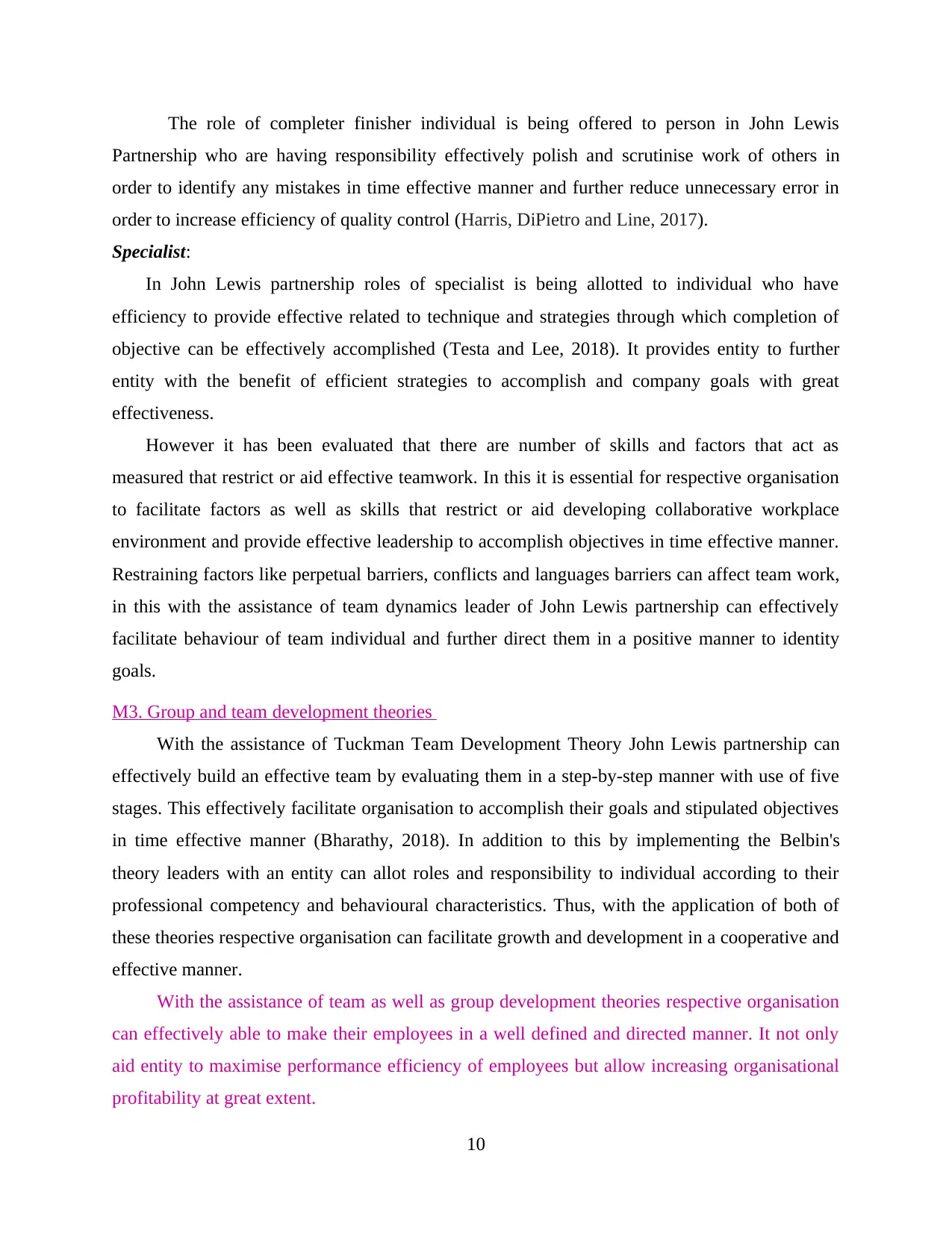
The role of completer finisher individual is being offered to person in John Lewis
Partnership who are having responsibility effectively polish and scrutinise work of others in
order to identify any mistakes in time effective manner and further reduce unnecessary error in
order to increase efficiency of quality control (Harris, DiPietro and Line, 2017).
Specialist:
In John Lewis partnership roles of specialist is being allotted to individual who have
efficiency to provide effective related to technique and strategies through which completion of
objective can be effectively accomplished (Testa and Lee, 2018). It provides entity to further
entity with the benefit of efficient strategies to accomplish and company goals with great
effectiveness.
However it has been evaluated that there are number of skills and factors that act as
measured that restrict or aid effective teamwork. In this it is essential for respective organisation
to facilitate factors as well as skills that restrict or aid developing collaborative workplace
environment and provide effective leadership to accomplish objectives in time effective manner.
Restraining factors like perpetual barriers, conflicts and languages barriers can affect team work,
in this with the assistance of team dynamics leader of John Lewis partnership can effectively
facilitate behaviour of team individual and further direct them in a positive manner to identity
goals.
M3. Group and team development theories
With the assistance of Tuckman Team Development Theory John Lewis partnership can
effectively build an effective team by evaluating them in a step-by-step manner with use of five
stages. This effectively facilitate organisation to accomplish their goals and stipulated objectives
in time effective manner (Bharathy, 2018). In addition to this by implementing the Belbin's
theory leaders with an entity can allot roles and responsibility to individual according to their
professional competency and behavioural characteristics. Thus, with the application of both of
these theories respective organisation can facilitate growth and development in a cooperative and
effective manner.
With the assistance of team as well as group development theories respective organisation
can effectively able to make their employees in a well defined and directed manner. It not only
aid entity to maximise performance efficiency of employees but allow increasing organisational
profitability at great extent.
10
Partnership who are having responsibility effectively polish and scrutinise work of others in
order to identify any mistakes in time effective manner and further reduce unnecessary error in
order to increase efficiency of quality control (Harris, DiPietro and Line, 2017).
Specialist:
In John Lewis partnership roles of specialist is being allotted to individual who have
efficiency to provide effective related to technique and strategies through which completion of
objective can be effectively accomplished (Testa and Lee, 2018). It provides entity to further
entity with the benefit of efficient strategies to accomplish and company goals with great
effectiveness.
However it has been evaluated that there are number of skills and factors that act as
measured that restrict or aid effective teamwork. In this it is essential for respective organisation
to facilitate factors as well as skills that restrict or aid developing collaborative workplace
environment and provide effective leadership to accomplish objectives in time effective manner.
Restraining factors like perpetual barriers, conflicts and languages barriers can affect team work,
in this with the assistance of team dynamics leader of John Lewis partnership can effectively
facilitate behaviour of team individual and further direct them in a positive manner to identity
goals.
M3. Group and team development theories
With the assistance of Tuckman Team Development Theory John Lewis partnership can
effectively build an effective team by evaluating them in a step-by-step manner with use of five
stages. This effectively facilitate organisation to accomplish their goals and stipulated objectives
in time effective manner (Bharathy, 2018). In addition to this by implementing the Belbin's
theory leaders with an entity can allot roles and responsibility to individual according to their
professional competency and behavioural characteristics. Thus, with the application of both of
these theories respective organisation can facilitate growth and development in a cooperative and
effective manner.
With the assistance of team as well as group development theories respective organisation
can effectively able to make their employees in a well defined and directed manner. It not only
aid entity to maximise performance efficiency of employees but allow increasing organisational
profitability at great extent.
10
⊘ This is a preview!⊘
Do you want full access?
Subscribe today to unlock all pages.

Trusted by 1+ million students worldwide
1 out of 17
Related Documents
Your All-in-One AI-Powered Toolkit for Academic Success.
+13062052269
info@desklib.com
Available 24*7 on WhatsApp / Email
![[object Object]](/_next/static/media/star-bottom.7253800d.svg)
Unlock your academic potential
Copyright © 2020–2026 A2Z Services. All Rights Reserved. Developed and managed by ZUCOL.





